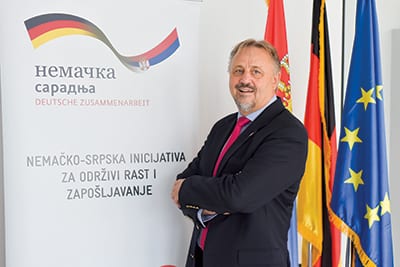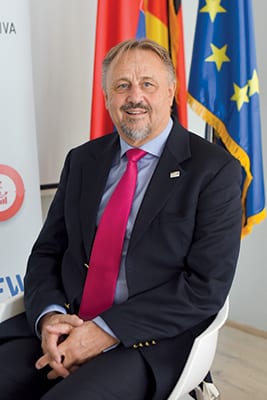We spoke with Heinz-Dieter Harbers, coordinator of the GIZ sector programme “Sustainable economic development and employment” in Serbia, about the implementation of dual education in Serbia, cooperation between various partners coming from the government and the business sector, and progress so far achieved.
Serbia’s two greatest challenges are reforming the labour market and education policies. Through the programme that you lead, GIZ has addressed a significant part of these challenges. What would you single out as the greatest successes so far?
– Along the mentioned challenges, it seems that continuous improvement and innovation of active labour market policy measures is needed in order to respond to the needs of both employers and young unemployed people. Through our projects, we have been able to recognise the efforts of the government, ministries, national and local institutions, employers and the youth themselves to find the best response and improve the position of youth on the labour market.
Our greatest success within youth employment promotion is that we shape skills training courses based on close cooperation with employers. Another example is the development of the project “Reform of vocational education in Serbia”, which has introduced elements of dual education to the Serbian system of vocational education and training.
As a result of this successful introduction, the Serbian government decided to draft a law on dual education, a process that GIZ, as an implementer of German development cooperation, has actively supported.
What are the key challenges you have identified that result in Serbia having an inadequate supply of well-trained workers?
– On the one hand, schools are dealing with outdated educational profiles and ill-equipped school workshops. On the other hand, young people lack practical experience. However, the good news is that educational profiles are now slowly being modernised and based on standardised qualifications.
This is a process that goes together with an increase in practical training days of students in companies, instead of being in school workshops that are not equipped in a way that would enable teachers to follow the latest trends in terms of equipment. Furthermore, German development cooperation through GIZ has also supported schools with some basic equipment.
Developing skills in a real working environment is very important for school pupils and gives them a better opportunity to position themselves in the labour market following graduation.
You have been in Serbia for a long time and have had the opportunity to get to know our country very well. In your opinion, what attracts German investors to Serbia and what causes them to be cautious when it comes to the capacity of the labour force?
– As a country, Serbia has a good industrial heritage, meaning people are willing and accustomed to working in this type of environment. The labour force in Serbia is well educated, very motivated and proficient in foreign languages. German companies are especially satisfied with the productivity of domestic workers.
On the other hand, when we look at specific sectors and regions, the dissemination of a highly qualified workforce can present a challenge. We also can’t ignore the fact that theoretical knowledge is not always in line with practical skills, and this has been recognised in many fields. However, we actively support technical schools, in order to produce profiles needed on the market.
You are cooperating with the German-Serbian Chamber of Commerce in implementing your programme. In which areas do you rely on them the most?
– Cooperation with the German-Serbian Chamber of Commerce is mostly focused on promoting dual education among member companies of the Chamber. With the support of German Development Cooperation, an expert with longstanding practical experience in vocational education and training was deployed at the German-Serbian Chamber of Commerce.
 Apart from focusing on the promotion of dual education, he is also actively cooperating and supporting the capacity development of the Education Centre of the Chamber of Commerce & Industry of Serbia. The German Development Cooperation “Private sector development project” is cooperating with AHK mostly in the sectors of metal and mechanical engineering.
Apart from focusing on the promotion of dual education, he is also actively cooperating and supporting the capacity development of the Education Centre of the Chamber of Commerce & Industry of Serbia. The German Development Cooperation “Private sector development project” is cooperating with AHK mostly in the sectors of metal and mechanical engineering.
We have strong support from them in terms of receiving feedback from the German industry regarding their needs and requests; we work jointly on different Business to Business (B2B) events i.e. purchasing initiative; implementation of occupational training i.e. export management training.
How satisfied are you with your cooperation with the Serbian Government and Serbia’s education institutions?
– Very satisfied. The Serbian Government recognised the importance of reforming three-year vocational education. The development of a dual education model that is suitable for Serbian conditions is a process in which we enjoy great cooperation with Serbian education institutions, while the Government is supporting the entire process. Everyone – from schools to the Ministry of Education, Science and Technological Development – plays a very important role.
I am very happy to see that industry and education build trust once they know that the government stands behind the whole process. We also cooperate very successfully with the Ministry of Youth and Sports by supporting them in the implementation of the National Strategy for Youth and the associated Action Plan, while in addition to this we also cooperate with the Ministry of Labour, Employment, Social and Veteran Affairs and the Ministry of Education, as well as the National Employment Service.
The Serbian Government is very open to cooperation and is working continuously to improve the business climate in Serbia
Alongside that, there is also a strong commitment among governmental institutions throughout the implementation. The Serbian Government is very open to cooperate and is working continuously to improve the business climate in Serbia. It is also very encouraging to see that cooperation with the Serbian Development Agency has been improved and a lot of activities are financed jointly.
A particular problem in Serbia is posed by unemployment among young people. Are you satisfied with the results so far achieved in promoting dual education and youth employment?
– A first pre-generation of students graduated last year. They enrolled in the profile of an industrial mechanic at the technical school in Pećinci. The cooperation in Pećinci was formed as a public-private partnership with company Bosch. Pupils went to Bosch’s production plant for practical training in the second and third years of their vocational education. Upon graduation, all 10 gained employment. This year we are happy to hear that again all students trained at Bosch were employed. This gives us reason to be satisfied with the results of this initiative.
We also have positive feedback from other cities and companies. More and more companies are joining and are willing to support schools and their pupils. We based our approach to existing potentials along these lines, and potentials where youth and employers are the actual driving force. From our experience, it seems that this approach enabled us to generate good results, but also to shape a new culture in Serbian youth entrepreneurship, skills training, agricultural cooperatives etc.
Serbia is also currently reforming its education system, and one of the topics is additional training for teachers. Last year, in cooperation with domestic institutes, you organised training for teaching personnel. How was this programme received among teachers?
– Teachers are always happy when they have an opportunity to learn and upgrade their knowledge. They are very pleased once they learn that the training courses we provide are a mixture of theory and practical experience.

For mechanical and electrical engineering, that means that training has to be organised and conducted using modern equipment.
Of course, we discuss with teachers and we listen to their needs, so I could say that training modules are tailormade. In this regard, we are very grateful to the expertise of domestic institutes, such as welding institutes, who can serve as excellent training providers.
We have also engaged existing resources in companies and among training providers in order to shape the training programmes in such a way that enables youth skills to start to work. The employer’s key criteria for selecting future workers are their dedication and willingness to work. This is what we promote and link: young people willing and ready to step up and learn, and employers willing to invest in their development.
The introduction of dual education simultaneously creates anxiety in Serbia that such educated personnel will leave the country and head to Germany. How would you respond to such fears?
– Youth mobility in this global context is something that cannot be forbidden or prevented. Serbia will very soon be part of the EU and mobility will be even higher. This also relates to labour force mobility. It is up to Serbia to create conditions and build on their own advantages to let young people leave and motivate them to return and start their lives, professionally and personally, here in Serbia. Along these lines, it is also necessary to create a positive business environment, so educated personnel have good opportunities to work and develop.
GIZ supports the Serbian Government in the finalisation and implementation of the Law on Dual Education
GIZ’s long-term goals in implementing this project include strengthening the international competitiveness of enterprises in Serbia, establishing high-quality vocational education for young people, more jobs, employment and growth of the economy. What do you see as the most important steps in the period ahead?
– It is important to further develop the main pillars of employment promotion: education and the economy, as well as employment facilitation services. At GIZ we define that as an integrated approach that enables bonding between sectors and institutions, and which demands close cross-sector cooperation and understanding of mutual interdependence. One particular example is our support to the Serbian Government in the finalisation and implementation of the Law on Dual Education.
Moreover, we will certainly continue supporting schools and companies, for example when it comes to training for teachers or offering training for in-company instructors.
In addition to that two important steps. One is the introduction of a new Industrial Policy of the Republic of Serbia that will be aligned with the needs and capacities of the existing economy. Another the fostering the start-up ecosystem and IT-entrepreneurship in Serbia. And it is crucial that this policy results in the emergence of new development projects. It is also important to work on the harmonisation of standards with EU legislation. In parallel to this, it is important to strengthen the capacities of SMEs in terms of soft skills.